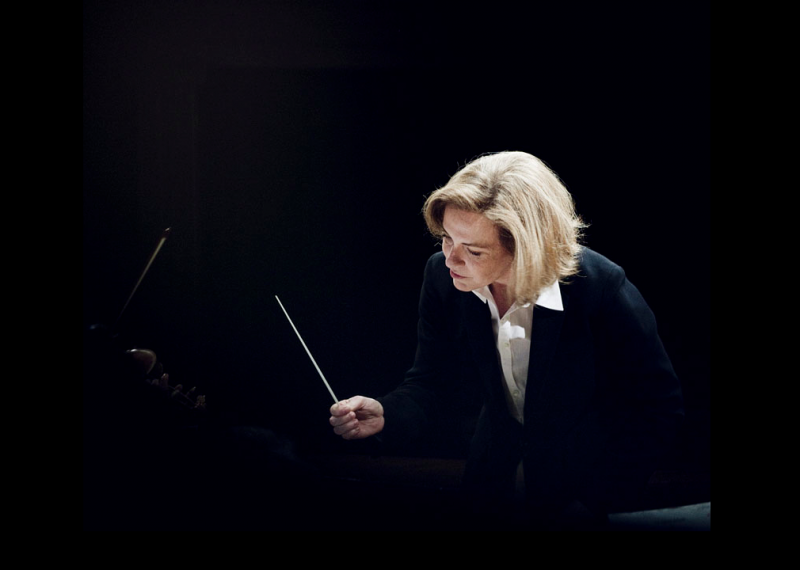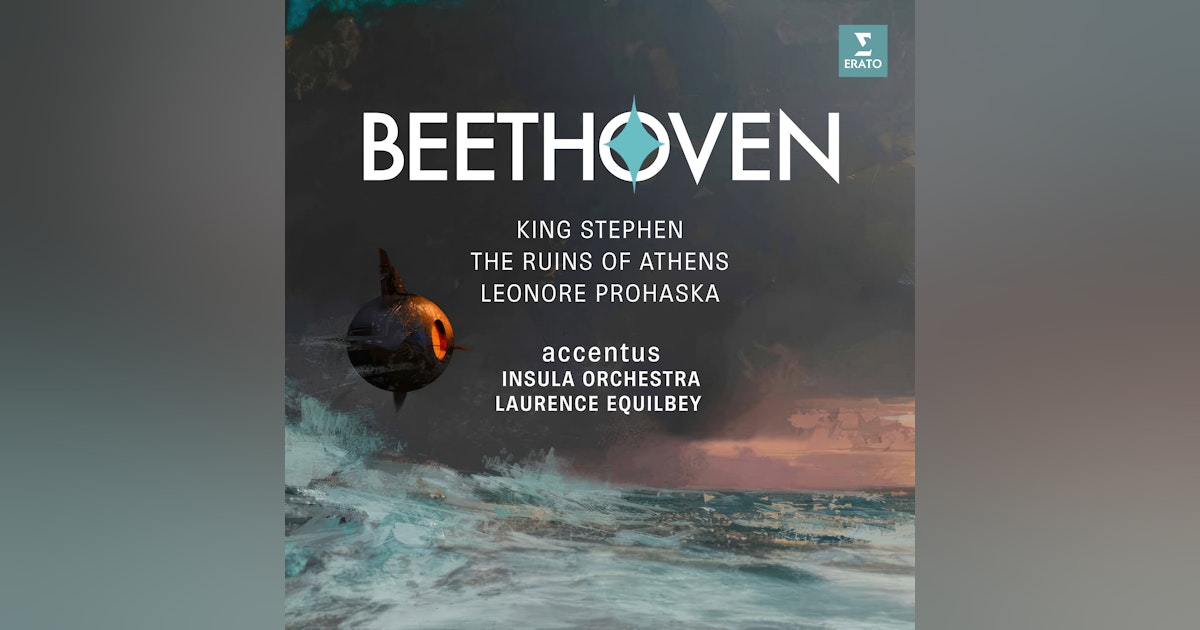
Insula Orchestra, accentus and Laurence Equilbey together with director Anotonin Baudry have created Beethoven Wars: a Manga-inspired immersive experience showcasing in music lesser-known but inspired Beethoven.
Here’s the teaser (which shows Insula’s home, La Seine Musicale, in Paris):
While there are various protagonists in the story line, the true subject is our Earth, and so this links back to Insula’s Pastoral for the Planet project. Rarely has a project been so aligned to the current global situation, as we shall see.
Here’s my review of the Aix performance (it had premiered in Paris and, as annotated below, goes to Hong Kong imminently).
Beethoven Wars accentus; Insula Orchestra / Laurence Equilbey with Ellen Giacone (soprano); Matthieu Heim (baritone). Grand Théâtre de Provence, Aix-en-Provence, France, 22.03.2025
Beethoven König Stefan: excerpts. Die Ruinen von Athen: excerpts. Leonore Prohaska: excerpts
Insula Orchestra, accentus and Laurence Equilbey together with director Antonin Baudry and his co-director Arthur Qwak have created Beethoven Wars: a Manga-inspired immersive experience showcasing in lesser-known but nevertheless inspired music by Beethoven
Why Manga? Because in Manga there is, as Laurence Equilbey explains in an interview supplied in Aix, heroism, a sense of a Utopian ideal and a core humanistic set of values These are, indeed, Beethoven’s values (the “Eroica” dedication story, perhaps, or even more pronouncedly Fidelio, and his Utopianism in the Ninth Symphony). But it is with two lesser known pieces Equilbey memorably calls “perles oubliées” that form the twin musical foundations of Beethoven Wars: King Stephen and The Ruins of Athens.
The subtitle of the event is “A battle for peace”; the invitation is to create a better world, despite multiple wars and so much suffering. It is not just a pacifist message, but the Manga imagery also emphasises the importance of ecology, and the whole experience reinforces the importance of arts to humanity. “L’art ne mourra pas” is a core message from Ruins of Athens.
There are two protagonists in the storyline: Stephan and Gisèle. But the true subject is our planet, and so this links back to Insula’s Pastoral for the Planet project. Rarely has a project been so aligned to the current global situation: the world is devastated by both war and climate change. King Stephan and Athena are engaged in war, a complete reversal of their situation as children, when they played together, carefree (when Athena was known as Gisèle). A peace treaty is signed, and they embark on a search for a habitable planet – Earth, where Nature is in full majesty but littered with ruins of previous civilisations (Athens, but in the future it could well be ours of today). Pollution and global warming have taken their toll. Although the atmosphere poisons Gisèle, she recovers on board the spaceship; to find a world that has been bult by the two reunited peoples.
A vision of hope, then, and while Manga might appeal to children on an immediate level, the message is clearly for all.
As the deliberately Star Wars opening indicates, the frame of reference is wide, but the message simple. Both Beethoven pieces, remember, were written in 1812 to celebrate the inauguration of a theatre in Pest in a celebration of peace and justice.
The technology involved in this multimedia event is remarkable: the Aix theatre was transformed into a huge cinema screen with ‘orchestra soundtrack’. But the combined result was far more than that, just as the Manga/Beethoven axis was much more than a mélange. Maga may be visceral in its imagery and colours bu so is Beethoven’s music.
It is with König Stephan we begin, the orchestra typically pointed in its accuracy in the Overture, the woodwind an absolute delight. The film’s Srephan is very removed from the context of playwright August von Kotzebue’s original though: this is the Nomad King, born during a war on the only habitable planet on the Mage Nebula (perhaps the name – Mage, magician, has relevancy here, too). The idea that childrens’ games allow the young King to ignore the sound of warfare can only resonate with the children of the war-torn nations of today. We are also introduced to Athena/.Gisèle The plot thenceforth concerns a search for a habitable planet. There are indications of a new Utopia rising from the ruins: ‘We will cultivate the arts and sciences to inspire mankind’ says Athena; ‘The glory of weapons will disappear in the flow of time’ says Stephan.
That planet, of course, is Earth.
The acual sound of the performance from Insula and accentus was lean, incisive and when called for, tender. It offers a Beethoven sound that seems perfect for this music; and accentus refects this in its own sense of clarity and linear accuracy (as one could hear in the first chorus, ‘Ruhend von seinen Taten’’ Resting from his deeds). The move to the more rhythmically active ‘Auf dunkelm Irrweg in finstern Hainen’ On a dark path in dark groves) offered vibrancy, segeue-ing into the ‘Siegesmarch’ (Triumphal March), so full of pomp, hard-sticked timpani, naturally, punctuating the discourse. But it is the way Equilbey can make a seemingly innocent melody sing so effectively that stood out; music many would pigeonhole as second-rate Beethoven appears here as soul-enervating.
One could argue the same for the guileless female chorus, ‘Wo die Unsculd Blumen streute’ (Where innocence scattered flowers). But maybe it was Equilbey’s alignment with melodrama and how it works that is so impressive: pieces such as Egmont, and Mendelssohn’s Athalie fascinate her, and how this enthusiasm seeps through in perfect pacing and into moments of enrapture: just listen to the almost hymnic ‘Geistlicher Marsch’ (Sacred March). Perhaps an aspect of that sense of dramatic pacing coms out in the final two movements form König Stephan, both choruses: ‘Heil, unserrm Könige’ (Hail to our King) – an impeccably Beethovenian paean which surely links to the final chorus of Fidelio, and ‘Heil! Heil! Heil unsern Enkeln!’ (Hail to our grandchildren) – a clear nod, in the film’s context, to a better future possible going forwards.
The remainder of the performance comprised mainly Die Ruinen von Athen, but with three excerpts from Leonore Prohaska. A delight to hear the Overture to Die Ruinen von Athen, Op. 113, in a brilliantly dramatic account; even finer to hear the mysterious low scales that usher in the miraculously beautiful, lyrical duet ‘Ohne Verschulden Knechtschaft dulden’ (To suffer servitude without cause’); and for all of Mathieu Heim’s warmth of voice, and Equilbey’s way with the aspirational phrases, it was Ellen Giacone’s purest of soprano voices that truly impressed. Their two voices work beautifully together, too, and their duet even overshadowed the one piece in the whole programme surely most people are familiar with: the ‘Turkish March,’ here rapid, jangly, a reminder of the period’s fascination with the ‘East’ (and indeed, Mozart’s Entführung).

Few, surely know the chorus that follows, ‘Du hast in deines Ärmels Falten’ (Thou hast taken the Moon into the folds of thy sleeve) a remarkable, almost nightmarish moment.
Equilbey’s choice of repertorie is lways thought-provoking. His is the ‘other’ Leonora: Leonore Prohaska, music to a play by Johann Friedrich Leopold Duncker (1770-1842). Beethoven composed incidental music, but the play appears not to have been performed. There are four extant pieces for the play of which we heard three. The Funeral March is like an Ur-Funeral March: there is no missing its intent. In the play, this is for ‘Elenora’. The original funeral march Beethoven wrote is lost, but he also orchestrated the funeral march from the A flat-Major Piano Sonata, op. 26. Then the melodrama, with the unforgettable sound of a glass harmonica (invented by Benjamin Franklin, no less) and Giacone unforgettably innocent in the Romance ‘Es blüht ine Blume’ (In my garden blooms a flower), accompanied only by the harp (Virginie Tarrête). The final march (non-Turk) and chorus (‘Schmückt die Altäre!’; Deck the altars) blossomed beautifully in Equilbey’s performance. How beautiful, how aspirational, that the final part of that chorus is a hymn to nobler joy and higher pleasure (‘Edlere Freude hoher Lust).
The sequence of purely orchestral movements is carefully chosen and ordered to underscore and mirror the story. And the most poignant part? The line from ‘Old Stephan’:
The most terrible truth is that we didn’t learn from our elders. We forgot their history. And we repeated the same mistakes.
The age-old trope, played out around all of us right now.
A VR version is due later this year. March 26-28 finds Insula in Hong Kong to present this momentous project. If in the final analysis, I find Sky Burial the more viscerally powerful piece, Beethoven Wars still opens up another huge can of worms. Lucky those in Hong Kong.
Perhaps worth mentioning for completeness’ sake that there is an alternative “Beethoven Wars” disc: type in those two words into Spotify and you get a “White Label” disc (that’s the actual name of the label, not a white label copy) of the incidental music to König Stefan and Die Ruinen von Athen, plus, in that case, the Prometheus Overture. The performances – Hungarian Radio and Television Chorus and the Budapest Philharmonic Orchestra with Géza Oberfrank and Andras Korodi – can be easily dismissed, however. Everything is lacklustre in comparison with Insula’s vibrant account; plus, the Hungarian orchestra is substantially below the French group’s level, and the recording muddies textures.
More of related interest though is an historical recording by Walter Goehr and the “Orchestra des Pays-Bas” (Netherlands Philharmonic Chorus and Orchestra). While the Overture is perhaps of its time in tempi, it has so much more life – and detail, despite its earlier provenance – than the Hungarian release. Equilbey has nothing to worry about here, either, but his is an interesting listen (Spotify for the Overture in the link section, full 29 minutes below).
Here’s what they call the “Dervish Chorus”:
Insula Orchestra’s release of this repertoire is only available as a digital release:









